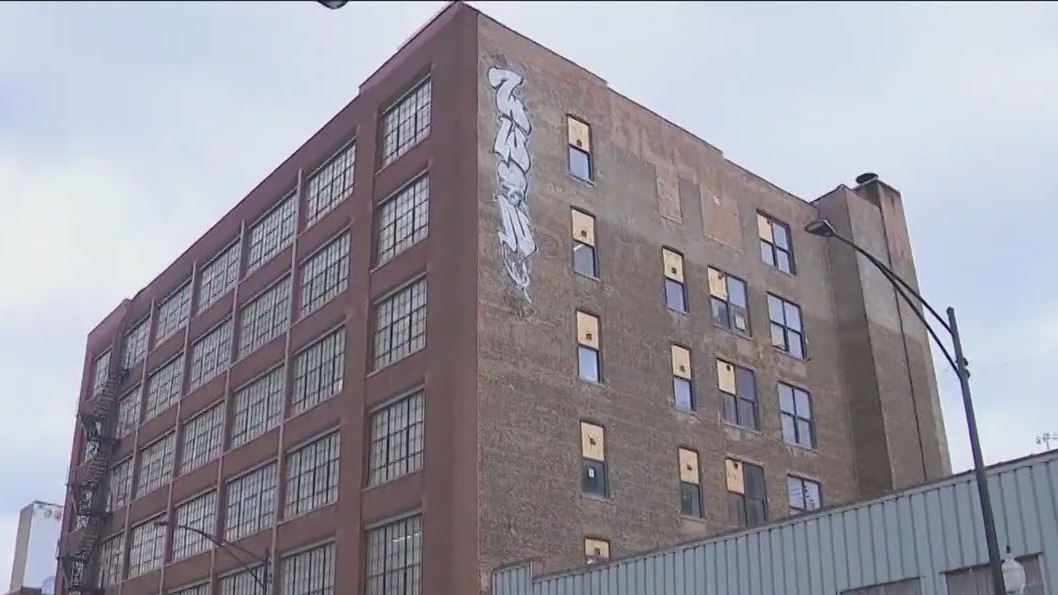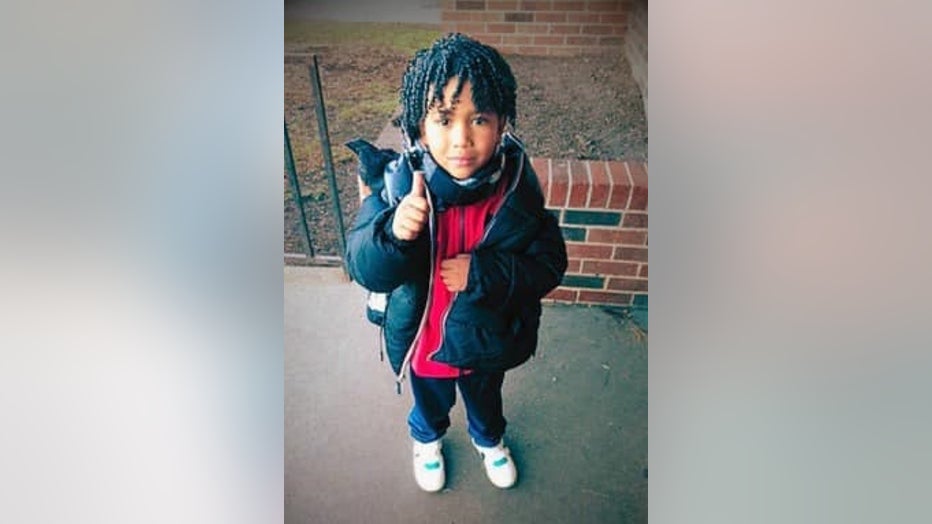5-year-old boy staying at Pilsen migrant shelter dies

5-year-old child staying at Pilsen migrant shelter dies after becoming ill
A 5-year-old boy staying at a migrant shelter in Pilsen died Sunday afternoon.
CHICAGO - The Chicago Department of Public Health has launched an investigation into the death of a 5-year-old boy who was living at a migrant shelter in Pilsen.
Around 2:49 p.m. Sunday, the boy was not feeling well and was transported from the migrant shelter, located at 2241 S. Halsted Street, to Comer Children's Hospital, where he was pronounced dead, according to police.
The Cook County Medical Examiner’s Office identified the boy on Monday as Jean Carlos Martinez Rivero. Autopsy results are still pending.
The incident does not appear to be criminal, and no offenders are in custody, police said.
Chicago Mayor Brandon Johnson released the following statement regarding the child's death:
"We are saddened at the tragic death of 5-year-old Jean Carlos Martinez, who was living in the temporary shelter at 2241 S. Halsted Street. Initial reports indicate that the child was suffering from a medical emergency and passed away shortly after arriving to Comer Children's Hospital. City officials are providing support to the family and are still gathering information on this tragedy. We will provide updates as more information becomes available.
My heart and my prayers go out to the Martinez family. The City will continue to provide resources and support to them during this difficult time."
Illinois Congresswoman Delia C. Ramirez issued a statement Monday evening on the child's death. It's shared below:
"The death of 5-year-old Jean Carlos Martinez Rivero is unacceptable and devastating. My heart and prayers are with his family. It is heartbreaking that substandard care, under-resourcing, and years of political inaction continue to steal bright futures and rob families and our communities of possibilities.
"Every shelter should be a safe, healthy space for families. Any facility that falls short of fulfilling that responsibility must be held accountable. I have spoken with the City of Chicago and we agree there must be a full investigation into whether Favorite Staffing can fulfill the important responsibility of providing safe and adequate temporary shelter for migrants and asylum seekers.
The Federal Government, including leadership at the Department of Homeland Security and the Administration, must grapple with the deadly consequences of inaction. The insufficient funding for cities like Chicago, which are actually welcoming and supporting asylum seekers, puts children at risk. Instead of negotiating and doubling down on ineffective draconian, Trump-era border policies, we must work together to secure adequate resources, improve intergovernmental cooperation, and expedite work permits for all. We all have a responsibility to ensure this never happens again, and we can and must do better."
On Monday, four additional migrants living at the Pilsen shelter were transported to area hospitals – all of them with high fevers, according to Chicago fire officials. Three of the patients are children, ages 1, 4, and 8.
Martinez Rivero’s death has reignited community organizers' complaints about conditions at shelters. It has also revived questions about how Chicago is responding to an influx of people unaccustomed to the city's cold winters and with few local contacts.
Chicago and other northern U.S. cities have struggled to find housing for tens of thousands of asylum-seekers, many of whom have been bused from Texas throughout the last year. Earlier this month, hundreds of asylum-seekers still awaited placement at airports and police stations in Chicago, some of them camped on sidewalks outside precinct buildings.
Although the city reports that police stations have been mostly cleared, massive shelters are not necessarily a safe alternative, said Annie Gomberg, a volunteer with the city's Police Station Response Team who has been working with Chicago's new arrivals since April.
The Pilsen shelter where the boy was living was initially set to house 1,000 migrants, but there are currently about 2,500 living there.
"The shelters are completely locked down to outside access. They’re doing this allegedly in order to protect the residents inside," Gomberg said.
But Gomberg said she suspects part of the reason for tight security is so the public cannot see how the shelters are being run.
"The people who live inside are coming to us and saying, ‘please give us blankets, give us clothing for our children, we need bottles, we need diapers,’" she said.
City officials did not immediately respond to a request for comment on whether the conditions at the shelter played a role in the child's death.
CEO of New Life Centers, Matt DeMateo, released the following statement on Tuesday, saying in part:
New Life Centers is walking with the family of Jean Carlos Martinez (Rivero) and providing victim services, case management, funeral planning support, and ongoing care for the family. Out of respect for the family and the ongoing investigation, New Life and the family are not taking interviews at this time. As expected, the family is devastated at the loss of their son. If you would like to give to support the family you can go to www.newlifecenters.org/give and select "Emergency Funding", noting Jean Carlos in the comments section.

Jean Carlos Martinez Rivero | Provided
Additionally, the City of Chicago released an update on Tuesday regarding the situation:
According to data collected from the City’s landing zone, the Martinez Rivero family arrived in Chicago on November 30, and on that same day, underwent intake at the shelter at 2241 S. Halsted. According to the incident report, on December 17, the Martinez family left the shelter for part of the morning and early afternoon, returning at 2:32 p.m. Approximately 13 minutes later, shelter staff witnessed a medical emergency and immediately responded by calling 911, after which staff began administering first aid to the child.
Shelter staff performed chest compressions while waiting for emergency responders to arrive. Chicago firefighters and paramedics arrived shortly thereafter and immediately transported the child to Comer Children’s Hospital where he was pronounced deceased.
This incident is not related to the three children taken to the hospital on Monday, Dec. 18. The child does not appear to have died from an infectious disease, according to the Chicago Department of Public Health, and there is no evidence of an outbreak at the shelter.
The CDPH team will continue to evaluate the situation. The cause of death is still being investigated.
On Monday evening, there was a feeling of heaviness at the shelter site, and a mounting concern among parents, including Antonio Contreras, a father of two children.
"At the moment, there are viruses, flu, and chicken pox, too. There are children with fevers, you know, it feels like sickness is in the air," said Contreras, who lives at the Pilsen shelter.
Officials say Cook County conducts weekly on-site medical visits to shelters throughout the city.
"This again is a shelter where we have families with small children, babies, toddlers. The county’s one visit a week is just not enough," said Ald. Byron Sigcho-Lopez, 25th Ward. "Today I was with federal representatives – asking and demanding that we meet directly with the White House to discuss the current conditions because we don’t want to have more tragedies like this."
Sigcho-Lopez says migrants need better access to medications, regular checkups, vaccines and more.
"They have to go on their own to try to look for medicines," said Sigcho-Lopez.
One of the clinics where many migrants seek care in Pilsen is the Alivio Medical Center. There, Dr. Stephanie Liou, a pediatrician, is working to expand access.
"This has been a big focus of our work for the last several months," said Liou.
In recent weeks, she has seen a number of illnesses, including chicken pox, among shelter residents.
"These are illnesses that spread in close contact, when folks are sharing spaces, when you’re exposed to someone else who’s sick," said Liou.
As a federally qualified health center, Alivio Medical Center – a bilingual, bicultural organization – is dedicated to serving all individuals, regardless of health insurance or financial means.
More than 26,000 asylum-seekers have arrived in Chicago since August 2022. The city has resettled or reunited over 10,000 migrants and is providing shelter for nearly 14,000 others in 27 temporary shelters, according to a statement from the mayor's office Monday afternoon.
Chicago's spending on resources for new arrivals totals $137 million, according to a city dashboard. The city says it has been ticketing and impounding buses trying to drop off migrants outside of designated zones.
"As temperatures continue to fall, the City is enacting stricter penalties to discourage bus companies from flouting these protocols. The inhumane treatment further endangers the safety and security of asylum seekers, and adds additional strain to City departments, volunteers and mutual aid partners tasked with easing what is already a harsh transition," the statement said.
Gomberg sent The Associated Press videos taken by shelter residents showing coughing and crying children in the crowded Pilsen shelter where Martinez was staying. One video showed water leaking from the ceiling onto the cots below.
Gomberg said people staying there told her mold is visible in the shelter, and lack of insulation makes the repurposed warehouse very cold. One of the photos shows a toddler wearing a snowsuit and winter hat indoors.
"If you know Chicago at all, this is really when the rubber meets the road," she said. "We could very easily have paralyzing snowstorms. We could very easily have below-zero temperatures."
The Associated Press contributed to this report.

